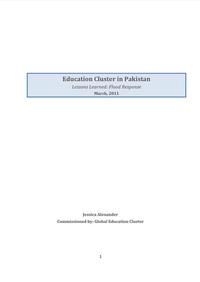Resources
Request support on coordination, information management, capacity development or other education in emergencies areas.
Demande de soutien en coordination, gestion de l’information, développement des capacités et autres domaines de l'éducation en situation d'urgence.
لطلب الدعم في مجال التنسيق ، إدارة المعلومات ، تنمية القدرات أو في اي مجال من مجالات التعليم في مناطق الطوارئ
Solicitar apoyo en coordinación, gestión de la información, desarrollo de capacidades u otra áreas en educación en emergencias.
Featured Resources
below you can find selected tools

COVID-19 Resources
View resources to support education in emergencies coordination during the COVID-19 pandemic.

Guidance on Education Cluster Co-Leadership Arrangements at the Country Level
Indicative Guidance for the establishment and management of co-leadership arrangements at the country level.

Inter-agency Network for Education in Emergencies
For technical education in emergencies resources, please visit the INEE website.
Ethiopia Education Cluster Infographic
Ethiopia Education Cluster Activities and gaps for emergency affected children as of May 2017
- Coordination: Information Management
- Emergency: Drought
- HPC: Implementation & Monitoring
Ethiopia Secondary Data Review Report 2016
Ethiopia has recorded one of the fastest growing economies (at an average 10.5%) in the Sub-Saharan Africa in the last 10 years. However, it ranks 174 of 188 countries on the 2015 Human Development Index implying a long way to go. The Ethiopia education system is vulnerable to both natural…
- Coordination: Needs Assessment, Information Management
- Emergency: Conflict, Complex, Drought, Floods, Displacement
- HPC: Needs Assessment & Analysis
Ethiopia Education Cluster EDUCATION IN EMERGENCY 2016/17 RESPONSE STRATEGY
The Federal MOEis leading the Education Cluster with UNICEF and Save the Children to respond to the need of Education in Emergency.In response to the recent crisis, the EEC has been officially reactivated in January 2016 in order to be able to coordinate partners and respond to the crisis. This is…
- Coordination: Cluster Strategy
- Emergency: Conflict, Complex, Drought, Floods
- HPC: Strategic Planning
Pakistan MIRA Provincial Assessment Working Group Terms of Reference
Pakistan is prone to repeated crisis which impact the well being of the population. In order to understand the impact of the crisis on the population, to understand their needs, identify their location, and develop an appropriate response to their needs, it is necessary to carry out an assessment.…
- Coordination: Cluster Management, Needs Assessment
- Emergency: Floods
- HPC: Needs Assessment & Analysis
Pakistan MIRA Code of Conduct Agreement
This code of conduct provides basic standards in relation to interviewing and documenting information as part of the Multi-cluster Initial Rapid Assessment (MIRA) of the areas where disaster occurs in Pakistan. The principles laid down in this code of conduct are to safeguard the best interests of…
- Coordination: Needs Assessment
- Emergency: Floods
- HPC: Needs Assessment & Analysis
The Education Cluster Thematic Case Study Series
Shared information, experiences and knowledge are the foundations for guiding decision-making within the Global and country-level Education Clusters. Access to the tacit knowledge held by individuals involved with the work of the Education Cluster as well as representatives from UN agencies, non-…
- Coordination: Coordination, Knowledge Mangement
- Emergency: Earthquakes, Floods
- Technical Areas: INEE Minimum Standards, Protection
INEE Toolkit Flyer
This document provides information about the INEE toolkit which contains over 800+ vetted tools and resources on education in emergencies through to recovery.
- Coordination: Coordination, Cluster Strategy, Needs Assessment
- HPC: Implementation & Monitoring, Needs Assessment & Analysis, Operational Peer Review and Evaluation, Resource Mobilisation, Strategic Planning
- Technical Areas: INEE Minimum Standards
INEE Minimum Standards
The INEE Minimum Standards Handbook contains 19 standards, each with accompanying key actions and guidance notes. The handbook aims to enhance the quality of educational preparedness, response and recovery
- Coordination: Coordination, Cluster Strategy, Needs Assessment
- HPC: Implementation & Monitoring, Needs Assessment & Analysis, Operational Peer Review and Evaluation, Resource Mobilisation, Strategic Planning
- Technical Areas: INEE Minimum Standards
Ethiopia Cluster: Status, Issues and Way Forward
This report summarises the situation the Education Cluster in Ethiopia was facing in 2011 and identifies challenges as well as opportunities the cluster faced in responding to the education crisis.
- Coordination: Knowledge Mangement
- Emergency: Conflict, Complex, Drought, Floods
- HPC: Operational Peer Review and Evaluation
Education Cluster in Pakistan: Lessons Learned Flood Response
The Global Education Cluster commissioned a lessons learned exercise covering the period from the start of the floods in July until March 2010. This report outlines the main findings from this review and highlights a number of recommendations
- Coordination: Knowledge Mangement
- Emergency: Floods
- HPC: Operational Peer Review and Evaluation
Filter results
Coordination(selected )
Country(selected )
Emergency(selected )
Humanitarian Programme Cycle(selected )
Language(selected )
Publication Date(selected )
Publisher(selected )
Resource Type(selected )
Technical Areas(selected )
Can’t find what you’re looking for?
Contact your relevant language Help Desk










